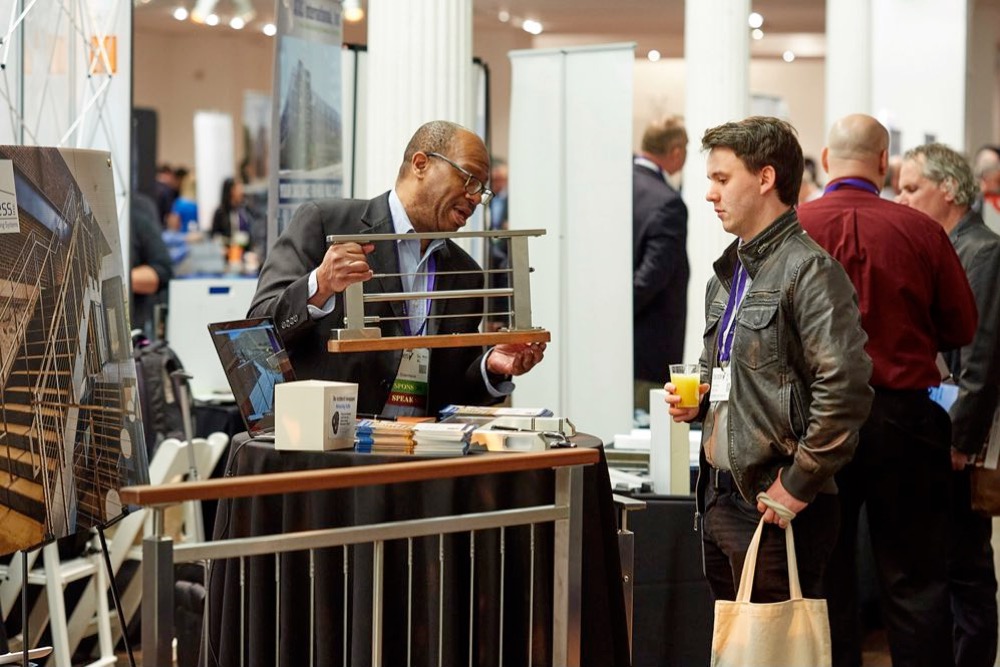B. Preservation : Strategies for Building Restoration
Instructor: Cheryl Saldanha, SGH
Instructor: Susan Knack-Brown, SGH
Instructor: Ricardo Medina, SGH
Instructor: Ross Cameron, Elkus Manfredi Architects
Instructor: Eric Wilson, Land Use & Buildings, Mayor's Office of Resiliency
Instructor: Cecil Scheib, NYU
Workshop Description »
Retaining a city’s existing buildings maintains its culture heritage and contributes to a vibrant urban landscape. It is also environmentally responsible to preserve and reuse these buildings, capitalizing on the earlier workmanship and materials. However, these buildings were not designed to perform as a modern structure, especially with respect to energy efficiency, resiliency, and user comfort. During this workshop, multiple experts will discuss how to evaluate the existing buildings and how to preserve and adapt the buildings to meet current performance needs to ensure their viability into the future.
C. Designing Glass to its Full Potential – How and Why the Rules have Changed
Instructor: Richard Green, Green Facades
Instructor: Charles Berman, DS+R
Instructor: Alan Maskin, Olson Kundig
Workshop Description »
What limits us from heroic glass design? Are we sure that we have made good choices for all our glass? When does size and utilization of glass become so different to what we were using 20 years ago that the conventional rules of thumb no longer apply? How do we design to avoid disaster?
Charles Berman, of Diller Scoffidio + Renfro, will present examples of the practice's use of glass to discuss architect's ambitions for glass in consideration of the realities introduced by glass as a robust engineered composite product.
Richard Green will present developments embodied in drafting the ASTM Standard for Structural Use of Glass, which provides a framework for specification by architects and design by engineers to balance cost, risk and reliability with appropriately controlled post-damage outcomes.
Alan Maskin will present the revitalization of the Seattle Space Needle as a case study, describing the architectural aspirations and how new glass technology facilitated the project objectives. Richard will describe the technical development and testing regimen for the project relating the principles of the draft standard and how they were implemented. The study contrasts replacing the glass technology of 1962 with the most current glass technology and how the design decisions have changed.
This session is a must for architects and engineers going beyond designing windows and utilizing the potential of glass.
D. (P)ReFabricate: An Interactive Reinterpretation of Prefabricated Building Enclosures
Instructor: Craig Copeland, Pelli Clarke Pelli
Instructor: Jimmy Chang, Pelli Clarke Pelli
Instructor: Kristin Hopkins-Clegg, Pelli Clarke Pelli
Instructor: Ryan Cramer, Buro Ehring
Instructor: Holger Schulze-Ehring, Buro Ehring
Instructor: Walter Woodington, Buro Ehring
Instructor: Dirk Schulte, Roschmann
Instructor: Oliver Lahr, Roschmann
Workshop Description »
Attendees of the workshop will work in teams of 4 or 5, guided by a rotation of 3 different instruction teams (each with members from PCPA, BuroEhring and Roschmann) to recalibrate key components of one iconic modern shelter or prefab home, selected from a choice of eight. To facilitate the activity, individual Rhino models of each shelter or prefab will be available during the workshop. The teams will identify and adjust key facade elements of the original designs to accommodate changes in context, contemporary energy standards, and ease of assembly.
E. Facades As Filters: Breaking the Barrier
Instructor: John Ivanoff, BuroHappold Engineering
Instructor: Emir A. Pekdemir, BuroHappold Engineering
Workshop Description »
This workshop describes the latest conceptual and built approaches in designing facades as environmental filters, rather than as barriers. An integrated project team approach is described that shows how to allow for controlled and desirable movement of air, light, water and energy into and out of highly efficient, buildable structures, including certifiably sustainable and healthy projects and new multifamily, institutional, and mixed-use buildings. Interdisciplinary presenters offer an overview of holistic enclosure and structural design followed by discussions of whole-building analytics, facade engineering, and lighting design. Considerations for procurement, installation, construction and commissioning are also reviewed, with attention to recent case studies in commercial work.
F. Textured Facades: Approaches to Metal Enclosure Systems
Instructor: Mike P. McGrath, MG McGrath
Instructor: Lee Pepin, MG McGrath
Instructor: Yushiro Okamoto , DS+R
Instructor: Anthony Saby, DS+R
Workshop Description »
Diller Scofidio + Renfro and MG McGrath has a unique history collaborating on multiple metal facade buildings that are geometrically complex, including the Berkeley Art Museum Pacific Film Archives (2016), the US Olympic & Paralympic Museum (2020) under construction, and the College of Holy Cross in design assist phase.
The workshop will be in two parts. In the first section, the presenters will discuss design hurdles, lessons learned, and future opportunities through each project.
In the second section, the attendees will work together to tackle some of the technical design challenges we faced using the case study of US Olympic & Paralympic Museum.
G. Topology Optimization: Synthesis of Surface and Structure
Instructor: Heath May, HKS LINE
Instructor: Timothy Logan, HKS LINE
Instructor: James Warton, HKS LINE
Workshop Description »
Structure is often treated as a secondary or supporting role to facade and envelope design. This seminar will discuss design synthesis between envelope and structure as implemented within ongoing research at HKS | LINE. Utilizing Altair’s OptiStruct for its robust optimization solvers, the presenters will demonstrate workflows that incorporate topology optimization and structural feedback early within conceptual design and massing development. The workflow presented leverages interoperability between Rhino and OptiStruct allowing improved iterative feedback between the two platforms.

 TKP Conference Center, 109 W 39th St
TKP Conference Center, 109 W 39th St WORKSHOPS
WORKSHOPS